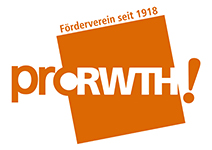


Image 1: © RWTH Aachen
Image 2: © RWTH Aachen
Image 3: © Peter Winandy
Association Bylaws
of Freunde und Förderer der RWTH Aachen e. V. – proRWTH –
(29. Januar 2016)
Please note that this English translation is not legally binding. Legally binding is the German version of this by-laws, publicized on www.proRWTH.de. This translation helps you to understand the association’s purpose and aims. For further questions on this, please contact us: info@proRWTH.de
Name and registered office
The association is registered in the association register and based in Aachen with the name
Freunde und Förderer der RWTH Aachen e. V. – proRWTH –
The purpose of the association is to support the scientific tasks of the Rheinisch-Westfälische Technische Hochschule RWTH Aachen University and its associated institutes and facilities as well as to support students. It is realized in particular by:
a) lectures and meetings,
b) offering funds for institutes, facilities and for other purposes of the university, including student aid, and in to lecturers, assistants and students to solve certain tasks for which public funds cannot be obtained,
c) awarding scholarships to talented students.
The association pursues exclusively and directly charitable purposes within the meaning of the “Tax- deductible purposes” section of the general tax code. The association works wholly dedicated to charitable activities and pursues charitable aims (non-profit). The association’s funds may only be used for statutable purposes. Members receive no benefits from the association. Members cannot claim any return of paid contributions or to the association’s assets if they leave the association or if the association will be liquidated.
No person may benefit from expenses that are alien to the purpose of the association or from disproportionately high rewards.
The financial means of the association are:
- Annual membership fees,
- Donations and foundations,
- other income.
The association may not accumulate a saving that ensures the sustainable fulfillment of its tax-privileged statutable purpose.
Members are:
- individual persons,
- legal entities,
- associations.
Persons who have made outstanding contributions to the association or the university as so called honorary members (voted on the general meeting at the suggestion of the executive board). Honorary members have all rights, but are not obliged to pay contributions.
The chairman and the treasurer (admission committee) of the association have to accept the admission.
Membership expires upon
- upon written notice of termination, given three months before the end of the association’s fiscal year,
- through immediate termination of the executive board if the membership fee is not paid after repeated reminders,
- through exclusion from the association if the executive board declares itself the exclusion with a two-thirds majority of its votes if there is an important reason.
The amount of the annual membership fee is determined by the General Meeting on the proposal of the Board of Directors.
The organs of the association are:
a) the general meeting,
b) the board of administration,
c) the executive board.
The members of the executive board and the board of administration do not receive any payment for their work and no compensation for their expenses.
The chairman of his deputy invite once a year to the general meeting. The invitation must be made at least three weeks in advance in written form to the members.
The chairman of his deputy can also invite to an extraordinary general meeting in the same form. This meeting has to be called within eight weeks if 50 members request this in writing, stating the items to be discussed.
The agenda of the general meeting includes.
a) receipt of the report on the past financial year,
b) approval of the annual financial statements and discharge of the executive board according to the certified public accountant,
c) approval of current and extraordinary expenses,
d) election of the executive board and two accountants,
e) reports, negotiations and resolutions in matters relating to the association,
f) election of committees as required.
Votes and elections are decided by a simple majority of the members present in the general meeting.
In the event of a tie/ equality of votes, the application is rejected; elections are decided by lot.
The general meeting has to be recorded in writing and must be signed by the chairman.
The board of administration consists of at least 30 people, all members of the association or legal representatives of such members.
It is elected by the general meeting with a simple majority of votes. They will be elected for three years. The re-election of a resigning member is permitted.
Member of the board of administration is ex officio:
- the rector of RWTH Aachen University,
- the chairman of the general student committee (AStA)
Each faculty sends a representative to be elected by its professors before the general meeting (otherwise the appointment passes on to the general meeting). Lifetime professors working at RWTH Aachen University can be also elected as representatives.
The board of administration decides on matters that are determined in these by-laws, submitted by the executive board or assigned by the general meeting. In particular, it has to prepare all items and proposals to be submitted to the general meeting, especially the elections.
The board of administration generally meets once a year at the invitation of the chairman. It has to be invited within eight weeks upon prior to the meeting in written form on request from at least one third of its members. The participation of ten members is required. A simple majority of votes decides. In a tie vote, the chairman shall be decisive.
A resolution by the Board of Directors through circulars and written voting is permitted. Here too, the simple majority of votes decides; in the event of a tie, the chairman’s vote decides.
The meeting of the board of administration has to be recorded in writing.
The board consists of:
a) the chairman,
b) the deputy chairman,
c) the secretary,
d) the treasurer and
e) up to five assistants.
The deputy chairman is the rector of RWTH Aachen University (ex officio). The members of the executive board are elected by the board of administration from among its members with a simple majority of votes. The election of the chairman, the secretary and the treasurer is for a period of five calendar years, for the first time for the period up to the end of 1953.
The membership of the executive board expires with the loss of membership in proRWTH e.V. Each year, for the first time at the end of 1949, one of the assistants from the executive board resigns from the executive board, in the order as determined by lot by the chairman at a board meeting. The term of office is max. 5 years. The re-election of a resigning member is permitted. If the new executive board is not elected in time before the end of the current chairman, he will remain the chairman until the new election within the first general meeting after the end of his/her term of office.
The executive board manages all affairs bases on the by-laws as well as following the decisions made at the general meetings and the meetings of the board of administration.
The chairman manages all affairs of the association on behalf of the executive board (internally and externally), chairs the general meetings, the meetings of the executive board and the board of administration and defines the agendas.
He/She can attend all meetings to carry out special work/meetings from special work groups as a consultant.
The deputy chairman manages all affairs of the chairman on his behalf.
The secretary and the treasurer support the chairman in carrying out his tasks. In particular, the treasurer takes over the cash management and is responsible for it.
The name of the association has to be added to the signature of the signatory.
The executive board can decide on important matters if the resolution cannot be shifted until a general meeting is called. In that case the next general meeting must consent to this decision.
Resolutions are made with the majority of the present executive board members. In a tie vote, the chairman’s vote decides.
A resolution by the executive board through circulars letters and written voting are permitted. The simple majority of votes decides; in the event of a tie, the chairman’s vote decides.
The meetings have to be recorded in writing.
The association’s legal and extrajudicial representation towards third parties in all matters is carried out solely by the chairman, the secretary and the treasurer of the association, who form the executive board within the meaning of Section 26 of the German Civil Code (BGB). The participation of two of these board members is adequate.
The fiscal year correspond the calendar year. The general meeting elects two accountants to audit the invoices for the past and current year as well as the cash management. If the general meeting is canceled in one year, the accountants elected in the previous year will stay in office.
Decisions on changes of the by-laws and on the liqudation of the association require the agreemnt of the general meeting with two thirds of the votes. The following paragraph is excluded from the possibility of modification:
In the event of the association’s liqudation or if its previous purpose drop out, the assets of proRWTH e.V. will be transferred wo RWTH Aachen University to support scientific tasks, unless the general meeting will decide otherwise with a majority of five sixths of the votes (only for purposes that are recognized as charitable).
Such a decision may only be carried out with the consent of the tax office.
Likewise, any decision to change Section 2 requires the approval of the tax office.
Any donation of assets or financial advantages to/for members of the association is excluded.
These by-laws repeal the previous by-laws. The general meeting gives the executive board the right to decide on changes of the by-laws that may be requested by the responsible official bodies.
With the new version these by-laws, the status of extraordinary members will no longer apply. These will become full members at the end of 1987 and will get the same rights and obligations as full members.

